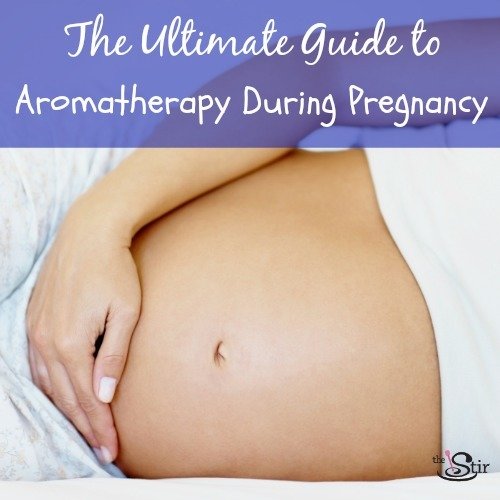Though it's one of the most joyful times for a woman, pregnancy may also cause uncomfortable symptoms — from morning sickness to swollen ankles and all manner of annoyances in between. Making matters worse: You may want to avoid over-the-counter treatments, preferring instead to take the more natural route to feeling your best.
Thankfully, aromatherapy is an unsung hero that can offer various benefits for expectant moms, from pure stress relief to keeping issues like nausea or backaches at bay. But a word of warning: "When considering plant oils in pregnancy, one should approach them in the same way as any other medication," says reproductive endocrinologist Anate Aelion Brauer, M.D., OB/GYN with Greenwich Fertility & IVF Center in Connecticut. "Although essential oils are natural, it is important to use caution, as many effects in pregnancy are unknown."
Here, the "dos and "don'ts" of using essential oils during pregnancy.
More from The Stir: 9 Natural Pain Relievers Safe to Use During Pregnancy (PHOTOS)

Do:
- Use only the best quality therapeutic essential oils, which according to the International Federation of Professional Aromatherapists (IFPA) can present very little hazard in comparison to synthetic oils. "Many of the oils in the retail market have been adulterated to lower the cost and extend the amount of oil obtained," explains Leslie Cohen, aromatherapist and owner of The Blissful Heart wellness collective in New Jersey. "Also, beware of blends that use fragrance oils, or 'natural' fragrance. These synthetic oils do not have the same therapeutic effects and can be confusing to the body as chemical constituents may have been added to 'stretch' an essential oil. Only true, pure essential oils should be used." Cohen recommends Floracopeia or Mountain Rose Herbs.
- Avoid essential oil "blends" that contain more than 3 oils. "During pregnancy, with it's heightened sense of smell and skin sensitivities, using these oils makes it difficult to determine which oil might negatively affect you," notes Cohen. "Best to start off very simple and pure and add slowly to your aromatic repertoire."
- Dilute any essential oil you're working with. To do: Mix a drop with at least a teaspoon (5ml) of a preferably organic fat-soluble base, or "carrier," oil (such as grapeseed oil, coconut oil, sesame, jojoba, sunflower, or sweet almond). "You can buy these oils at some major supermarkets or health food stores," advises Cohen. "Basically, if it's okay to eat, it's okay to use on your skin. If using essential oils in a bath is desired, no more than 4 drops should be added. And it's best to mix the oil with a dispersant first, like milk, Epsom, or sea salts, before adding to bath water."
- Consider waiting until the second trimester to use essential oils, after which the baby is more fully developed. That's because essential oils will cross the placental barrier and have the potential to affect the fetus. Jane Buckle, Ph.D., RN, in her book, Clinical Aromatherapy concedes that _"_the use of essential oils in pregnancy is a contentious subject, especially during the vital first 3-month period." The bottom-line: "Essential oils should be used at a minimum for the first trimester, on an as-needed only basis where reward supersedes risk," explains Cary Caster, founder of 21 Drops, licensed massage therapist, and certified clinical aromatherapist. If you are considering using them in early pregnancy, make sure to consult your health care provider.
- Combat nausea, heartburn, muscle pain, and colds with ginger, advises professional labor doula and clinical herbalist Kristi Beguin. It can also work to improve appetite. Lemon, lime, and spearmint can treat upset stomachs, as well, notes Brauer.
- Address anxiety and headaches, skin irritations, backache, and allergy symptoms with lavender. "It also can prevent early labor," notes Beguin.
- Alleviate muscle aches, muscle spasm, emotional upset, and cold sores with bergamot. It also helps to reduce fevers.
- Manage swelling with cypress. "One should always contact their doctor first, as this may be a sign of elevated blood pressure," notes Brauer. "But once cleared by a physician, one can consider using cypress oil mixed with warm water for soaking swollen feet or legs, as this essential oil has been linked to improving circulation."
- Tackle restlessness with the soothing properties of ylang ylang, vetiver, and/or sandalwood.
- Consult a certified aromatherapist, who you can find by searching on the Aromatherapy Registration Council site, for questions about essential oil use in the first trimester, advises Caster.
- Consider using aromatherapy during the birth. "During delivery, there are many safe essential oils to address pain and calming of the emotions," explains Caster. Specifically, massage of the lower back with jasmine, juniper, geranium, clary sage, rose and lavender has been reported to provide subjective benefit in labor.
Don't:
- Use one particular oil for a long period of time, for example, every day for several weeks.
- Feel pressured to go with any particular oil if you have reservations. "Lavender and juniper have both been avoided in the past, because it was thought that they might possibly cause a pregnant client to have a period or reduce the amount of amniotic fluid in the body respectively," explains Cohen. "The IFPA guidelines address this concern reminding us that the use of essential oils in appropriate dilutions would not cause these effects. That said, if a client came to me and stated that she had a concern with these or any other oils, I would respect that and not use them. During pregnancy is not the time, I believe, to contradict the mom-to-be. I trust the 'mama bear' instinct completely."
- Use certain contradicated oils such as cinnamon, clove, rosemary, peppermint, black pepper, juniper, basil, oregano, thyme, clary sage, calamus, mugwort, tansy, and pennyroyal. Some are no-nos, because they're overstimulating and may cause contractions or preterm labor, while others may thin the blood, explains Beguin. You can find a list of oils to steer clear of on the National Association for Holistic Aromatherapy (NAHA) site. When in doubt, consult your health care provider and/or a certified aromatherapist.
- Apply essential oils undiluted to skin or take any internally, warns Cohen.
- Use essential oils if you have a sensitive medical history (such as miscarriage, any vaginal bleeding during your pregnancy, epilepsy, heart problems, diabetes, blood clotting problems, or thyroid, liver, or kidney disease).
More from The Stir: 5 Ways to Boost Mom & Baby's Health During & After Pregnancy
Have you ever used aromatherapy for pregnancy symptoms? If not, would you try it?
Image via AlexanderNovikov/iStock & Yuri/iStock




